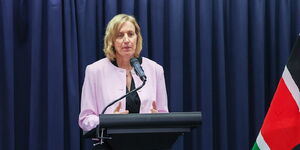The National Syndemic Diseases Control Council (NSDCC) report has revealed that 3,400 lives are lost each year to cervical cancer, a disease caused by the Human Papillomavirus (HPV).
HPV is a virus that spreads easily through contact, including sexual contact. There are over 200 types of HPV, with some causing genital warts and others leading to various forms of cancer.
According to NSDCC reports, cervical cancer remains a leading cause of death despite the introduction of the HPV vaccine in 2019.
The report further noted that 33 per cent of eligible girls received the first dose in 2020, but by 2021, only 31 per cent had completed both doses.
"Cervical cancer, caused by HPV, claims 3,400 lives annually in Kenya. Despite the HPV vaccine rollout in 2019, uptake remains low, with only 33% receiving the 1st dose in 2020, and 31% completing both doses in 2021. Let’s act, combat hesitancy & ensure every girl is protected!"
The HPV vaccine is used to protect against infections and is mostly given to younger age groups. The vaccine is most effective when administered before exposure to HPV during pre-teen or teenage years.
According to the Global Cancer Observatory (GLOBOCAN) report, Kenya records approximately 5,845 new cervical cancer cases annually and reports over 3,000 deaths each year.
The GLOBOCAN 2022 report stated that cervical cancer was the second most common cancer among women in Kenya, after breast cancer, with an incidence rate of around 40 cases per 10,000 women per year.
Women aged 45 to 59 years account for 43 per cent of the cases, followed by those aged 30 to 44 at 35 per cent. Younger women, aged 15 to 29, make up only 2 per cent of cases.
Women are urged to complete the vaccine dosage to help them stay away from these cancerous diseases.
The low uptake of the vaccine is attributed to several challenges, including misinformation, stigma, and fear of side effects, which discourage families from seeking vaccination. This has resulted in low coverage rates across the country.
To improve uptake, Kenyans are being encouraged to consider receiving a single dose of the vaccine, as it is easier to administer and may motivate more people to complete the vaccination.












